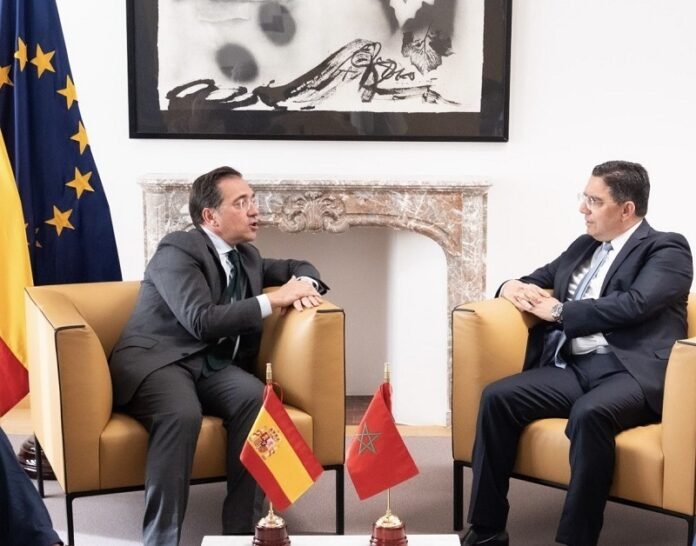Between Official Partnership and Daily Hostility: When the “Marhaba” Operation Clashes with Spanish Extremism
While the Moroccan and Spanish governments rush to dispel rumors and reassure the public about the future of their bilateral relations, many Moroccans living in Spain face a reality that starkly contradicts official statements.
At the heart of the “Marhaba” operation—meant to symbolize human and logistical rapprochement between the two shores of the Mediterranean—countless Moroccans endure racist acts and provocations by Spanish extremists who oppose not only the presence of the Moroccan community but any form of relations with Morocco.
On the sidelines of the European Union-Southern Neighborhood ministerial meeting, MFA Nasser Bourita held talks in Brussels, with his Spanish counterpart, Mr. José Manuel Albares, as part of regular political consultations between the Kingdom of Morocco and the Kingdom of Spain pic.twitter.com/g8hkFu0MSj
— Moroccan Diplomacy 🇲🇦 (@Marocdiplo_EN) July 14, 2025
Spanish Foreign Minister José Manuel Albares’ declarations denying any intention to close the customs crossings at the occupied cities of Ceuta and Melilla may serve as diplomatic reassurance, yet they do not eliminate growing concerns within Moroccan media and human rights circles over the escalation of anti-Moroccan rhetoric. This hostile discourse resonates with certain far-right political formations in Spain that do not hesitate to exploit even minor administrative procedures—such as family crossings—to fuel hatred and incitement.
“Misinterpretations or motivations aimed at harming the good relations between Madrid and Rabat.”
— José Manuel Albares
Albares’ statement is more than a mere denial; it is a high-level political affirmation of Spain’s commitment to a strategic partnership, strengthened since Madrid’s 2022 endorsement of Morocco’s autonomy plan for Western Sahara. This message carries a dual purpose: reassurance to Rabat and a warning to extremist currents within Spain.
Nevertheless, despite its diplomatic importance, this statement does not quell the mounting fears among the Moroccan community, especially after racist incidents in cities like Torre Pacheco, and the overt incitement led by parties such as Vox, which seek to weaponize any administrative measure—like the Marhaba crossing—as a tool to mobilize public opinion against Moroccan migrants.
Though Madrid and Rabat agreed to prioritize the smooth passage of travelers during summer, this decision did not exempt travelers from suspicious looks, subtle humiliations, and silent discrimination on the ground. In fact, those so-called “misinterpretations” Albares denounced are often not spontaneous but rather deployed within a rising right-wing political discourse that opposes any rapprochement with the Arab and Maghreb world.
The “Marhaba” operation, one of the largest cross-border logistical undertakings in the world, should not be reduced to counting cars or measuring crossing times. It must serve as a test of the maturity of bilateral relations and the capacity of both states to protect the dignity of Moroccan residents in Europe, especially when they become easy targets of populist agitation.
While official reports now describe Moroccan-Spanish relations as a “model of cooperation,” this partnership will not be complete without explicit guarantees of legal and social protection for Moroccans in Spain, ensuring they are not scapegoated during every political or electoral crisis.
A strategic partnership cannot thrive at negotiation tables while collapsing in Spanish streets under the blows of hatred and stigmatization. Between the borders opened by high-level ministerial coordination and hearts closed to the faces of the Maghrebi diaspora, the truth remains painful and often absent from diplomatic rhetoric.
Summary:
José Manuel Albares’ statements, though vital to maintaining the strategic trajectory of Moroccan-Spanish relations, alone cannot answer the fundamental questions posed by daily realities:
How far is Madrid truly willing to go—beyond words—to protect Moroccans living on its soil?
Are economic interests and large-scale projects enough to cover the growing uproar of xenophobia?
And will “Marhaba” this year be merely a logistical operation… or a missed opportunity to fundamentally rethink what it means to be “Moroccan in Spain”?


